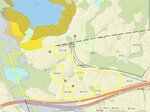

This week, Manchester's Open Space Committee meeting sought to take the lead on an issue that had dogged local conservation-minded residents for decades: the future of Gordon College’s 130-acre wooded lands adjacent to Route 128 in the Limited Commercial District.
The committee aimed to find a mutually agreeable plan in collaboration with Gordon College that would permanently conserve the college-owned parcel, which is popular among hikers and mountain bikers. Initially, the idea was led by the Manchester MBTA District Task Force and Dennison “Denny” Hall with the hope that by rezoning 7 to 10 acres of Gordon's land for residential housing, the school would, in exchange, permanently put the remaining 120 acres into a conservation restriction barring development.
What to do about the Gordon College woods has long been discussed among local conservationists.
Gang and Helen Bethell from the Open Space Committee had urged the Select Board earlier this year to consider restricting the entire parcel. At the time, Bethell expressed regret that the Gordon College parcel was included for potential development in Manchester’s Master Plan, deeming it “a mistake.” The Select Board declined to pursue their request.
On Monday, Bethell emphasized the significance of the Gordon College land, calling it “the most important piece of land in Manchester,” and noted its environmental importance due to marshlands, vernal ponds, and woodlands. Her posture had turned more collaborative on Monday. This may be because Gordon College is protected by the state’s “Dover Amendment” rule that grants educational and religious institutions development rights that can bypass restrictive local zoning, much like the 40B protections for developers of affordable housing.
According to Gang and Manchester’s Town Planner Marc Resnick, Gordon College is exploring housing development opportunities in Manchester. Discussions are underway with a developer for 100+ housing units, including low-cost options for faculty and staff.
Chris Olney, chair of the MBTA District Task Force, indicated that the possibility of exchanging residential zoning to conserve most of Gordon’s lands is being considered. The parcel is one of two currently being evaluated for the MBTA zoning in the LCD.
The specific approach to managing the Gordon College land remains unclear, with the Open Space Committee and the MBTA Task Force pursuing their respective goals. The Open Space Committee advocates for the perpetual protection of most of the land. At the same time, the MBTA Task Force seeks to balance state mandates with preserving Manchester’s small-town character and addressing housing challenges.
Options for collaborating with Gordon include purchasing the land outright, purchasing a conservation easement, or doing neither and instead challenging the college’s development rights legally if a developer steps forward. The challenge is that despite decades of identifying the property as strategic for conservation, no monies have been put aside or on the table.
Some members of the Open Space Committee expressed optimism about potential funding from outside private groups like the Manchester Essex Conservation Trust (MECT). The MECT's history has shown no interest in collaborating with real estate developers, choosing instead to fight any development to the end—by exerting pressure on town boards and going to court, without compromise.
Jack Burke, chair of Manchester’s Community Preservation Committee, on Monday acknowledged the possibility that CPC funds may be used for a purchase, but the amount remains uncertain.